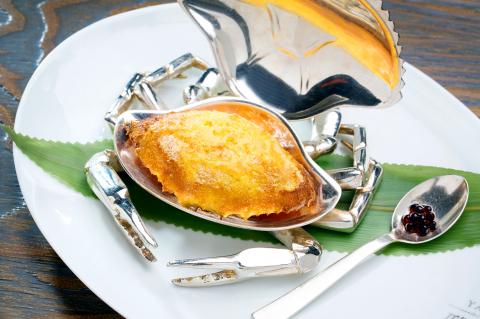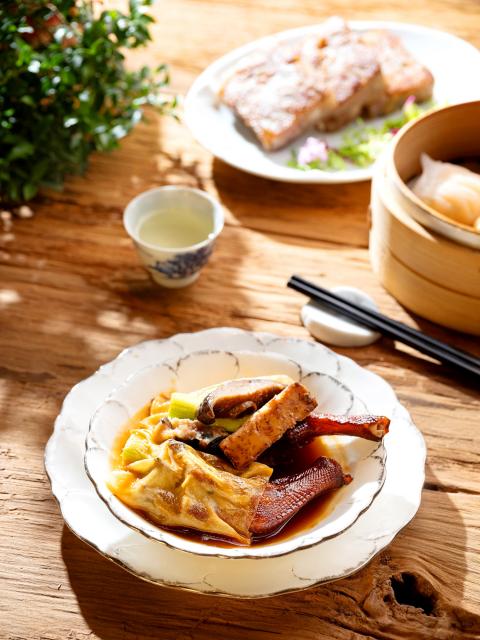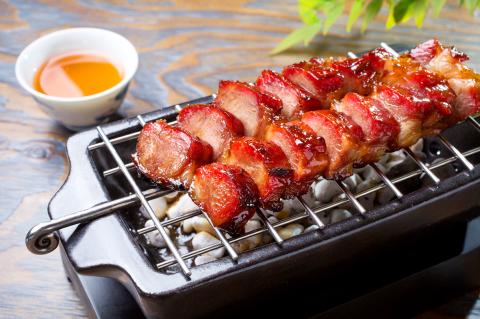Two weeks ago, I ate a duck’s foot for the first time at Ya Ge (雅閣), the Michelin-starred fine-dining Cantonese restaurant located in the Mandarin Oriental. The appendage in question was thinly veiled by a cloak of slippery tofu skin that suffused its fragrance into everything it touched — the stuffing of shrimp, pork, taro and celery, crowned with a webbed duck’s foot, glazed in abalone sauce.
Lifting the foot to my mouth, I discovered that this delicacy — much like the sea cucumbers and birds’ nests of my youth — was more a matter of mouthfeel than taste. The gelatinous folds had little in the way of their own flavor, instead absorbing the milkiness of the tofu skin and umami of the sauce. As the bird’s delicate bones clattered to my plate, I realized that despite never having eaten a duck’s foot before, there was something familiar and comforting about the way it tasted after all.
In the plush dining rooms of the Mandarin Oriental, such nostalgic textures and flavor combinations are seeing a revival under the leadership of Ya Ge’s chef de cuisine Tse Man (謝文). Chef Tse, who previously cooked at the legendary Fook Lam Moon in Hong Kong, applies his expert knowledge of Cantonese fare and exacting selection of ingredients to the restaurant’s new seasonal dim sum menu, which stretches the imagination back in time.

Photo courtesy of Mandarin Oriental Taipei
The steamed duck’s feet (NT$300) are just one of many retro dishes developed anew. Deep-fried mashed taro filled with foie gras and mushrooms (NT$300) evokes old-world glamor with its feathery, crispy golden skirt. Taro remains the star of that dish, given the restrained use of goose liver. And the evergreen barbecued pork bun (NT$300) is reliable, with fluffy bread wrapped around a substantial filling.
But the innovations do not disappoint either. A steamed dumpling stuffed with crab meat, shrimp, egg white and black truffle (NT$360) is an easy standout. Black truffle has become a lazy shorthand for luxury, indiscriminately deployed in marked-up versions of basic dishes — black truffle French fries or scrambled eggs, to name a few. In these dumplings, however, the fungus is used with intention, and melds well with the springy seafood and silky egg whites.
Like its understated interior, Ya Ge knows how to produce a showstopper in the most unassuming places. Moreish vegetarian dumplings (NT$270) filled with matsutake mushrooms are folded and painted like ornamental carp napping in a bamboo basket. The molten interiors of salted egg custard buns (NT$270), a perennial favorite, are encased in black charcoal dough with a bold brush of gold dust, lending dramatic flair to each bite.

Photo courtesy of Mandarin Oriental Taipei
But the most intricate of all is the oven-baked crab (NT$750), served in its own custom-made crab-shaped holder. A silver carapace, complete with crab legs and pincers, mimics the shells of the flower crab and Japanese blue crab, whose insides have been meticulously hand-picked, de-boned and shaped into a crisp cutlet minimally seasoned with onions. The clean flavors and exquisite presentation signal the kitchen’s confidence in their ingredients and techniques, with no resorting to cover-ups.
While my appetite that day centered on the new dim sum menu, a la carte options, like the crab, also deserve attention. Crispy roasted chicken (NT$750 for a half, NT$1,480 for a whole) lives up to its name, achieving a seemingly impossible combination of crisp, bronzed skin lining juicy and tender meat. The chicken is flavorsome on its own, but is also given a leg up by an unusual dip of lemon juice and fish sauce.
Honey-glazed barbecued pork (NT$980), using meat from three-month-old local Berkshire piglets, is served atop a bed of hot stones that amplify the smells and sounds of sizzling lard. The fatty meat is not the melt-in-your-mouth texture that I prefer, but carries a bit of chew. For a well-rounded meal, seasonal vegetables — on this occasion, sweet asparagus — braised in supreme broth (NT$400) will do a lot to offset the richness of the other dishes.

Photo courtesy of Mandarin Oriental Taipei
The rose-tinted glasses of yesteryear also extend to the desserts. Humble red bean soup (NT$320), with a velvety texture from partially mashed beans, benefits from the lightly perfumed note of 10-year-aged dried tangerine peel. It’s a rare find — red bean soup cooked with tangerine peel is now seldom available outside the home and the most traditional of dessert shops. But if sweet soup is not your cup of tea, the organic beancurd with mashed taro (NT$320) is a heavenly pairing in a bowl and a loving nod to Taiwan’s local produce.
Davina Tham ate at Ya Ge courtesy of Mandarin Oriental Taipei.

May 18 to May 24 Pastor Yang Hsu’s (楊煦) congregation was shocked upon seeing the land he chose to build his orphanage. It was surrounded by mountains on three sides, and the only way to access it was to cross a river by foot. The soil was poor due to runoff, and large rocks strewn across the plot prevented much from growing. In addition, there was no running water or electricity. But it was all Yang could afford. He and his Indigenous Atayal wife Lin Feng-ying (林鳳英) had already been caring for 24 orphans in their home, and they were in

On May 2, Chinese Nationalist Party (KMT) Chairman Eric Chu (朱立倫), at a meeting in support of Taipei city councilors at party headquarters, compared President William Lai (賴清德) to Hitler. Chu claimed that unlike any other democracy worldwide in history, no other leader was rooting out opposing parties like Lai and the Democratic Progressive Party (DPP). That his statements are wildly inaccurate was not the point. It was a rallying cry, not a history lesson. This was intentional to provoke the international diplomatic community into a response, which was promptly provided. Both the German and Israeli offices issued statements on Facebook

Even by the standards of Ukraine’s International Legion, which comprises volunteers from over 55 countries, Han has an unusual backstory. Born in Taichung, he grew up in Costa Rica — then one of Taiwan’s diplomatic allies — where a relative worked for the embassy. After attending an American international high school in San Jose, Costa Rica’s capital, Han — who prefers to use only his given name for OPSEC (operations security) reasons — moved to the US in his teens. He attended Penn State University before returning to Taiwan to work in the semiconductor industry in Kaohsiung, where he

Australia’s ABC last week published a piece on the recall campaign. The article emphasized the divisions in Taiwanese society and blamed the recall for worsening them. It quotes a supporter of the Taiwan People’s Party (TPP) as saying “I’m 43 years old, born and raised here, and I’ve never seen the country this divided in my entire life.” Apparently, as an adult, she slept through the post-election violence in 2000 and 2004 by the Chinese Nationalist Party (KMT), the veiled coup threats by the military when Chen Shui-bian (陳水扁) became president, the 2006 Red Shirt protests against him ginned up by